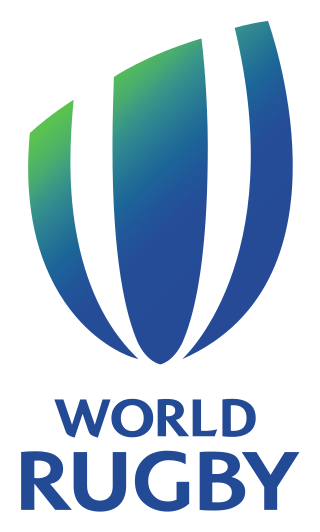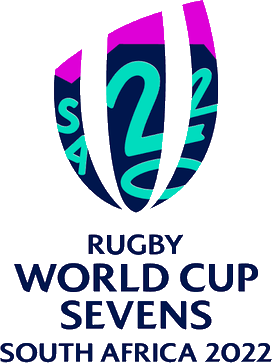
Rugby union football, commonly known simply as rugby union or more often just rugby, is a close-contact team sport that originated at Rugby School in England in the first half of the 19th century. Rugby is based on running with the ball in hand. In its most common form, a game is played between two teams of 15 players each, using an oval-shaped ball on a rectangular field called a pitch. The field has H-shaped goalposts at both ends.

The Men's Rugby World Cup is a rugby union tournament contested every four years between the top international teams, the winners of which are recognised as the World champions of the sport.

The Rugby Championship, formerly known as the Tri Nations Series (1996–2011), is an international rugby union competition contested annually by Argentina, Australia, New Zealand, and South Africa. These are traditionally the four highest ranked national teams in the Southern Hemisphere; the Six Nations is a similar tournament in the Northern Hemisphere.

World Rugby is the governing body for the sport of rugby union. World Rugby organises the Rugby World Cup every four years, the sport's most recognised and most profitable competition. It also organises a number of other international competitions, such as the World Rugby Sevens Series, the Rugby World Cup Sevens, the World Under 20 Championship, and the Pacific Nations Cup.

The 1995 Rugby World Cup, was the third Rugby World Cup. It was hosted and won by South Africa, and was the first Rugby World Cup in which every match was held in one country.

The British Amateur Rugby League Association (BARLA) is an association for social and recreational rugby league. It works jointly with the Rugby Football League through the RFL Community Board.

The IRB2015 Rugby World Cup was the eighth Rugby World Cup, the quadrennial rugby union world championship. The tournament was hosted by England from 18 September to 31 October. Of the 20 countries competing in the World Cup in 2011, there was only one change: Uruguay replaced Russia. This was the first World Cup with no new teams to the tournament.

The Falcons – better known by their Afrikaans name the Valke and now known as the Hino Valke for sponsorship reasons – are a South African rugby union team in Gauteng province that participates in the annual Currie Cup tournament.

Rugby union in Argentina is a hugely popular team sport. The first rugby match played in the country dates back to 1873, as the game was introduced by the British. The Argentina national team, sometimes referred to as the Pumas, have competed at the Rugby World Cup, and are considered a tier one nation by the sport's governing body, World Rugby.

The Morocco national rugby union team are a national sporting side, representing Morocco in rugby union. The team is also known as the Atlas Lions. Morocco is governed by the Fédération Royale Marocaine de Rugby. Morocco competes in the Africa Cup annually. The team has won the competition in 2003 and 2005. They usually play their internationals in Casablanca.

The Rugby Africa Cup is a two-year men's rugby union tournament involving the top 16 African nations based on their World Rugby rankings, it is organised by Rugby Africa. The tournament was first held in 2000. It was renamed the Rugby Africa Cup in November 2019, it was previously called the Africa Cup since 2006, the CAR Top 9 and CAR Top 10.
The 2006 Africa Cup was the seventh edition of highest level rugby union tournament in Africa. In this edition, the tournament expanded from nine nations to twelve leading to a change in the format of the tournament which now includes four pools of three teams. Results from Pool 1 & 2 also counted for the 2007 Rugby World Cup qualifying.
The 2000 Africa Cup was the first edition of highest level rugby union tournament in Africa.
The 2015 Currie Cup qualification tournament was a competition organised by the South African Rugby Union which featured seven teams and was played between 12 June and 25 July 2015. The winner of the tournament would qualify for the 2015 Currie Cup Premier Division, while the remaining six teams would play in the 2015 Currie Cup First Division.
Makazole Drex Mapimpi is a South African professional rugby union player for the Sharks in the United Rugby Championship and South Africa national team. He usually plays as a winger and centre. He was part of the winning Springboks of the 2019 Rugby World Cup in Japan and the 2023 Rugby World Cup in France. He became the first South African to score a try in a World Cup Final.

The 2022 Rugby World Cup Sevens was the eighth edition of the Rugby World Cup Sevens organised by World Rugby. The 2022 tournament, comprising 24 men's and 16 women's teams as previously, was played over three days in one venue in September. It took place at the Cape Town Stadium in Cape Town, South Africa between 9 and 11 September 2022. It was the first Rugby World Cup Sevens in Africa. The dates were chosen to take into account in the Commonwealth Games tournament which took place in July the same year.
The qualification process for the 2023 Rugby World Cup in France began during the pool stages of the 2019 tournament in Japan, at which the top three teams from each of the four pools qualified automatically for the 2023 event. A further eight teams qualified through regional, cross-regional play-offs and the repechage process.

The qualification process for the 2021 Rugby World Cup began on 9 August 2019 with 12 teams qualifying to the tournament which was to be held in New Zealand. The 2021 Rugby World Cup was postponed by one year in March 2021 to 2022 due to the COVID-19 pandemic.
The women's tournament for the 2022 Rugby World Cup Sevens was held in Cape Town, South Africa from 9 to 11 September at the Cape Town Stadium.












